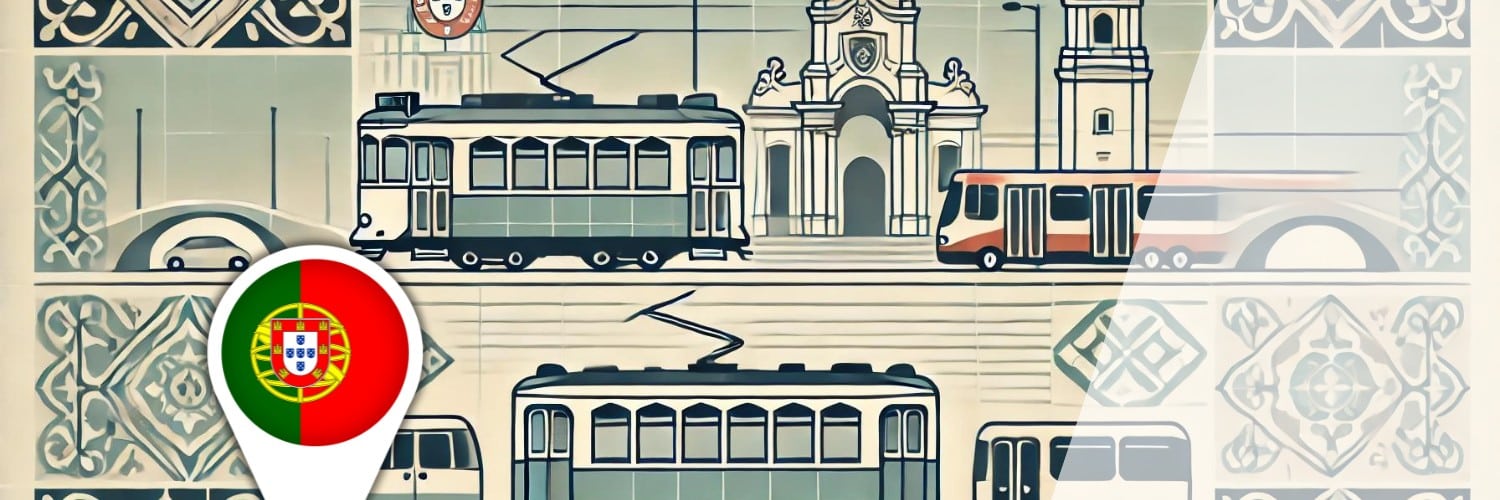Portugal Public Transportation

For U.S. citizens planning to move to Portugal, understanding the public transportation system is essential to making the most of your new life abroad. Portugal offers a comprehensive and efficient public transport network that ensures easy travel, both within the main cities and across the country.
Portugal’s public transportation system is robust, efficient, and user-friendly, making it a convenient option for those considering moving to Portugal. Whether navigating Lisbon’s bustling streets, exploring Porto’s scenic routes, or traveling between cities, the variety of transportation modes available ensures that you can do so with ease and comfort.
Here’s a detailed look at what you can expect regarding public transportation once you move to Portugal.
Urban Transportation
Portugal’s major cities, such as Lisbon and Porto, are well-served by various public transportation options. Buses operated by companies like Carris in Lisbon and STCP in Porto run frequently and cover extensive routes, making it easy to navigate the urban landscape. Both cities also feature tram systems. Lisbon is renowned for its historic trams, such as the iconic tram 28, which traverses the city’s hilly streets. Porto offers a combination of modern and historic trams, providing a scenic and practical way to get around.
The metro systems in Lisbon and Porto are among the most efficient in Europe. Lisbon’s metro consists of four lines that connect the city center to the suburbs. The lines are continuously extended to improve connectivity and expand to parts of the city that still need to be covered. Porto’s metro features six lines extending to nearby towns. Both systems are known for their punctuality, cleanliness, and safety.
In addition to buses and trams, Lisbon and Porto have funiculars and elevators to help residents and visitors navigate the steep terrain. The Santa Justa Elevator, the Bica Funicular in Lisbon, and the Guindais Funicular in Porto are practical and offer stunning views of the cities.
Portugal Visas & Immigration
We Can Help!
#1 Contact us to get a free quote, or
#2 Schedule a Consultation now.
Intercity Transportation
Traveling between cities in Portugal is straightforward, thanks to the extensive rail network operated by Comboios de Portugal (CP). High-speed Alfa Pendular trains connect major cities such as Lisbon, Porto, Braga, and Faro, offering a comfortable and quick way to traverse the country. Intercidades (Intercity) trains provide a slightly slower but equally comfortable option, linking many towns and cities. Regional and interregional trains offer frequent and reliable service for those traveling to smaller towns.
Long-distance bus services are another excellent option for intercity travel. Companies like Rede Expressos and Renex cover almost every corner of Portugal, providing modern coaches equipped with amenities like Wi-Fi and air conditioning.
Local and Regional Transportation
Suburban trains and ferries provide convenient transport options for those living in the suburbs or smaller towns. Suburban trains in Lisbon and Porto connect the cities with their surrounding areas, offering frequent services, especially during peak hours. In Lisbon, ferry services operated by Transtejo and Soflusa cross the Tagus River, linking the city with suburbs like Almada and Barreiro, which, given Lisbon’s increasing housing prices, have become pretty popular in the last few years (more about the housing market in Portugal, here).
Ticketing and Passes
Navigating the ticketing system is straightforward. Single tickets are available for all modes of transport and can be purchased at stations, kiosks, or directly from the driver. Travel cards, such as the Navegantesin Lisbon or the Andante card in Porto, offer discounted fares and unlimited travel on public transport, making them ideal for frequent travelers. Monthly passes are also available, providing significant savings for those who use public transport regularly.
Here you have some examples of pricing for the different transportation options:
- Metro one-way tickets are around $1,95 in Lisbon and $1,50 in Porto
- Bus one-way tickets are $2,15 in Lisbon and $3,80 in Porto
- Navegantes (Lisbon’s monthly pass for metro and bus) and Andante (Porto’s monthly pass) are around $33/month
- A ticket on the Alfa-Pendular from Lisbon to Porto costs $33, while the Intercity ticket for the same trip is $30
- Ferry rides between Lisbon and the south side of the river are $3,00
- The Lisbon-Cascais train ride costs $1,90/way or $34/month
Portugal Visas & Immigration
We Can Help!
#1 Contact us to get a free quote, or
#2 Schedule a Consultation now.
Accessibility and Technology
Portugal’s public transportation system is designed to be accessible to everyone. Most modern trams, metros, and trains are equipped with facilities for people with disabilities, including ramps, lifts, and designated seating areas. Information is typically available in both Portuguese and English, with clear signage and route maps.
Technology plays a significant role in enhancing the user experience. Mobile apps and websites provided by CP, Carris, and Metro offer route maps, schedules, ticket purchases, and real-time updates, ensuring that you have all the information you need at any given time. Google Maps is also widely used to navigate public transport routes in real-time.
Future Developments
Portugal continues to invest in expanding and upgrading its public transportation infrastructure. Ongoing projects include the expansion of metro lines in Lisbon (as mentioned) and Porto, as well as improvements to the rail network aimed at enhancing speed and efficiency (the TGV, a high-speed train, is in the plans for the next few years). There is also a strong focus on sustainability, with investments in electric buses and green energy to reduce carbon emissions.
Frequent Questions

1. What are the main modes of public transportation in Lisbon and Porto?
Buses, trams, metros, funiculars, and elevators are the main modes of transportation in Lisbon and Porto.
2. How do I travel between cities in Portugal?
You can travel between cities by high-speed Alfa Pendular trains, Intercidades trains, regional trains, or long-distance buses.
3. Are there any scenic tram routes in Lisbon?
Yes, the iconic tram 28 in Lisbon offers a scenic route through the city’s historic neighborhoods.
4. What is the cost of a one-way metro ticket in Lisbon and Porto?
A one-way metro ticket costs around $1.95 in Lisbon and $1.50 in Porto.
5. How much does a monthly pass cost for public transportation in Lisbon and Porto?
Monthly passes, like the Navegantes in Lisbon and the Andante card in Porto, cost around $33 per month.
Portugal Visas & Immigration
We Can Help!
#1 Contact us to get a free quote, or
#2 Schedule a Consultation now.
6. Is public transportation in Portugal accessible for people with disabilities?
Yes, most modern trams, metros, and trains have facilities for people with disabilities, including ramps, lifts, and designated seating areas.
7. Can I use a travel card for discounted fares on public transport?
Yes, travel cards like the Navegantes and Andante cards offer discounted fares and unlimited travel.
8. What are the main intercity bus companies in Portugal?
Rede Expressos and Renex are the main intercity bus companies in Portugal.
9. How do I purchase tickets for public transportation in Portugal?
Tickets can be purchased at stations, kiosks, from the driver, or via mobile apps and websites.
10. What are the ticket prices for ferry rides across the Tagus River in Lisbon?
Ferry rides cost around $3.00.
11. How can I stay updated on public transportation schedules and routes?
Mobile apps and websites provided by CP, Carris, and Metro, as well as Google Maps, offer real-time updates and route information.
12. Are there funiculars in Lisbon and Porto?
Yes, Lisbon has the Bica Funicular and the Santa Justa Elevator, while Porto has the Guindais Funicular.
13. What is the cost of a train ride from Lisbon to Cascais?
A one-way train ride from Lisbon to Cascais costs $1.90 or $34 for a monthly pass.
14. Are there electric buses in Portugal?
Yes, Portugal is investing in electric buses as part of its sustainability initiatives to reduce carbon emissions.
15. Is English commonly used in the public transportation system in Portugal?
Yes, information is typically available in both Portuguese and English.
16. What is the cost of a ticket on the Alfa Pendular train from Lisbon to Porto?
A ticket on the Alfa Pendular train costs $33, while an Intercity ticket for the same trip costs $30.
17. What are some popular urban transport companies in Lisbon and Porto?
Carris operates buses in Lisbon, and STCP operates buses in Porto.
18. What types of properties are available in popular Portuguese regions?
Portugal offers urban apartments, rural homes, and luxury condos by the beach in regions like Lisbon, Porto, and Algarve.
19. What is the standard duration for rental contracts in Portugal?
Rental contracts are typically signed for one year but can be negotiated for shorter or longer periods.
20. What future developments are planned for Portugal’s public transportation?
Future developments include the expansion of metro lines in Lisbon and Porto and improvements to the rail network, with a strong focus on sustainability.
Portugal Visas & Immigration
We Can Help!
#1 Contact us to get a free quote, or
#2 Schedule a Consultation now.

